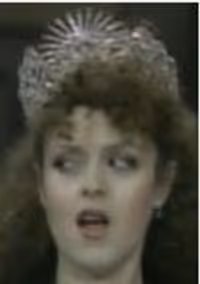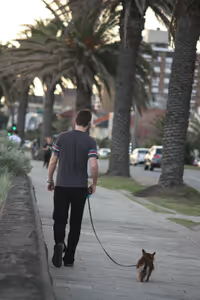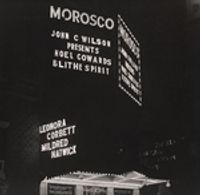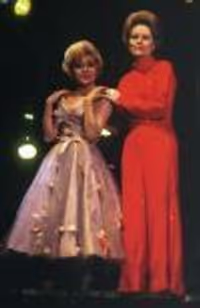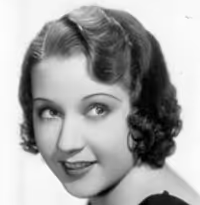Sondheim on "Oklahoma"
goodlead
Stand-by Joined: 3/30/18
#1Sondheim on "Oklahoma"
Posted: 6/2/23 at 7:22pm
Sondheim said that "Oklahoma!" is about homosexuality on the prairie -- maybe not his exact words but certainly his thought. Does anyone understand what he meant? It's certainly a one-of-a-kind reaction..
MemorableUserName
Broadway Legend Joined: 3/27/19
#2Sondheim on "Oklahoma"
Posted: 6/2/23 at 8:03pm
"Stephen Sondheim, whom Hammerstein took under his wing in the summer when he was writing Oklahoma!, said in a recent interview that his mentor “took a play that was about homosexuality in the West and turned it into a sunny musical…beyond what Lynn Riggs had written, about the opening of territories, the promise of America.” (“The play had distinct homoerotic undertones in the relationship between Curly and Jeeter,” Sondheim clarified in an email to me; Hammerstein changed Jeeter’s name to Jud in the musical.)"
https://www.orartswatch.org/the-hidden-history-of-oklahoma/
#3Sondheim on "Oklahoma"
Posted: 6/3/23 at 4:40am
I wonder what he thought of the revival, if he saw it. Clearly I think Daniel Fish did tap into a little bit of the homosexual undertones and there was nothing ‘sunny’ about it at all.
#4Sondheim on "Oklahoma"
Posted: 6/3/23 at 1:05pm
That's very interesting; and when thought of in that sense, the characterization of Jud in the play makes a lot more sense.
OhHiJohnny
Swing Joined: 10/20/17
#5Sondheim on "Oklahoma"
Posted: 6/3/23 at 1:26pm
Oh my god, I finally get a chance to fully explain my niche reading of a VERY particular moment.
In the Act One smokehouse scene, after Jud fires his gun off, Curly takes the gun and fires it off at a knot hole in the side of the wall. I know this moment is meant to show the two men one upping each other, and Curly’s deft handling of a gun. But why is there a knot hole in the side of the smokehouse? Why do people keep referring to nefarious things happening in/ around the smokehouse?
Is it because there’s a hole… in the wall? A hole that Curly has frequented? One that Curly is now threatening Jud with, saying that even behind a wall he can see who Jud really is?
… anywho
#6Sondheim on "Oklahoma"
Posted: 6/3/23 at 4:46pm
binau said: "...and there was nothing ‘sunny’ about it at all."
Except keeping the house lights on--at bright golden haze level-- for the entire show save for the blackout scene.
#7Sondheim on "Oklahoma"
Posted: 6/3/23 at 6:37pm
It should be noted, too, that Riggs was gay. There’s an anthology of some of his collected plays recently published (including Green Grow) and they’re really interesting, with more gay subtext to be found.
I doubt it, but I wonder if SS ever discussed homosexuality with Oscar— not necessarily his, of course. I can’t imagine Oscar being as homophobic as some of his contemporaries, or his collaborator and his hateful wife, although Yip Harburg made some mean, uncharacteristic cracks about Robert Lewis, so who knows? And I’m assuming by the time she died, Dorothy H. knew Steve was gay, too.
leefowler
Broadway Star Joined: 7/13/04
#8Sondheim on "Oklahoma"
Posted: 6/3/23 at 6:38pm
If you're suggesting that Jud is into glory holes, I'm all in.
#9Sondheim on "Oklahoma"
Posted: 6/3/23 at 6:41pm
leefowler said: "If you're suggesting that Jud is into glory holes, I'm all in."
That’s a take on OKLAHOMA! I’d be curious to see. Jud is a fascinating character.
#10Sondheim on "Oklahoma"
Posted: 6/3/23 at 6:48pm
MemorableUserName said: ""Stephen Sondheim, whom Hammerstein took under his wing in the summer when he was writingOklahoma!, said ina recent interviewthat his mentor “took a play that was about homosexuality in the West and turned it into a sunny musical…beyond what Lynn Riggshad written, about the opening of territories, the promise of America.” (“The play had distinct homoerotic undertones in the relationship between Curly and Jeeter,” Sondheim clarified in an email to me; Hammerstein changed Jeeter’s name to Jud in the musical.)"
https://www.orartswatch.org/the-hidden-history-of-oklahoma/"
I've read Green Grow the Lilacs many times, and this interpretation is utterly absurd. Riggs was gay, something I don't think a lot of people know, but that doesn't really illuminate his play's subtext anymore than Sondheim and Furth being gay illuminates Company's (and we all know what they thought of that interpretation). It confounds the whole meaning of the play, where two men are competing for the woman they both want.
Is this really something Sondheim said, or is it an Onion parody?
#11Sondheim on "Oklahoma"
Posted: 6/3/23 at 8:33pm
joevitus said: "MemorableUserName said: ""Stephen Sondheim, whom Hammerstein took under his wing in the summer when he was writingOklahoma!, said ina recent interviewthat his mentor “took a play that was about homosexuality in the West and turned it into a sunny musical…beyond what Lynn Riggshad written, about the opening of territories, the promise of America.” (“The play had distinct homoerotic undertones in the relationship between Curly and Jeeter,” Sondheim clarified in an email to me; Hammerstein changed Jeeter’s name to Jud in the musical.)"
https://www.orartswatch.org/the-hidden-history-of-oklahoma/"
I've read Green Grow the Lilacs many times, and this interpretation is utterly absurd. Riggs was gay, something I don't think a lot of people know, but that doesn't really illuminate his play's subtext anymore than Sondheim and Furth being gay illuminates Company's (and we all know what they thought of that interpretation). It confounds the whole meaning of the play, where two men are competing for the woman they both want.
Is this really something Sondheim said, or is it an Onion parody?"
I heard him say it in person during one of his salons with Frank Rich. So, yes.
Have you read any of the other Riggs plays, btw? Just asking out of curiosity. I really liked them.
#12Sondheim on "Oklahoma"
Posted: 6/4/23 at 3:10am
The relationship between Jud, sex and porn is complicated. I’ve always read it that in the original production, it’s used to signify that he’s in touch with his sexual desires and is “experienced” more than the more socially conformist Curly. Then the Fish revival uses it to posit Jud not as a rebel but as a quasi-incel figure.
#13Sondheim on "Oklahoma"
Posted: 6/4/23 at 10:54am
but how was homosexuality implied in that era? Loner, bad reputation, conflicted personality, outcast, dark, frightening, etc. I see now (not really just playing along with this theory) that the attempted courtship of Laurie was not propelled by desire, but for revenge.
#14Sondheim on
Posted: 6/4/23 at 12:30pm
jv92 said: "joevitus said: "MemorableUserName said: ""Stephen Sondheim, whom Hammerstein took under his wing in the summer when he was writingOklahoma!, said ina recent interviewthat his mentor “took a play that was about homosexuality in the West and turned it into a sunny musical…beyond what Lynn Riggshad written, about the opening of territories, the promise of America.” (“The play had distinct homoerotic undertones in the relationship between Curly and Jeeter,” Sondheim clarified in an email to me; Hammerstein changed Jeeter’s name to Jud in the musical.)"
https://www.orartswatch.org/the-hidden-history-of-oklahoma/"
I've read Green Grow the Lilacs many times, and this interpretation is utterly absurd. Riggs was gay, something I don't think a lot of people know, but that doesn't really illuminate his play's subtext anymore than Sondheim and Furth being gay illuminates Company's (and we all know what they thought of that interpretation). It confounds the whole meaning of the play, where two men are competing for the woman they both want.
Is this really something Sondheim said, or is it an Onion parody?"
I heard him say it in person during one of his salons with Frank Rich. So, yes.
Have you read any of the other Riggs plays, btw? Just asking out of curiosity. I really liked them."
I haven't, but I would like to. Green Grow the Lilacs is such an interesting, strange play. The characters keep exploding into violence in different ways (I'd include Laurey's attempt to "beautify" Ado Annie as an example of this). And yet at the same time, there's a wistful, nostalgic quality to it. I wonder if he's implying that the closer one lives to nature--away from the civilized world--the more one is susceptible to violent impulses, and that the settling of the land by nature meant confronting our violent natures, or what. But it's very curious and a quite different "vibe" than Oklahoma! Riggs says in his preface that he considered the action of the play to be like the recreation of an old cowboy song, and I think he captured that perfectly. It's easy to see why the show didn't catch on in its original form, but it's an intriguing work.
I'm really shocked Sondheim would take the position that he did, considering his own antipathy towards the "Bobby is really gay" interpretation of Company. To be clear here, I'm a gay man who has zero problem with gay characters, and there are unquestionably characters who were coded to be gay in the days before that could be explicitly depicted, and I like that people are recognizing subtext, and have no problem with making subtext text. I just think it's an incredibly wrong-headed interpretation here.
On the other hand, I would have zero problem with a production of either the original play or Oklahoma! adopting that interpretation. Classics can be revisited and reinterpreted in any number of ways.
#15Sondheim on
Posted: 6/4/23 at 12:42pm
Impeach2017 said: "but how was homosexuality implied in that era? Loner, bad reputation, conflicted personality, outcast, dark, frightening, etc. I see now (not really just playing along with this theory) that the attempted courtship of Laurie was not propelled by desire, but for revenge."
Wow, you're going for really broad terms here that could be applied to any outcast group, and you seem to be conflating historical periods. Actually, in that era, if Jeeter--that's the name of Rigg's character--was coded gay in a way meant to align with the prejudices of the era, he'd have been made effeminate and wanting to be a woman or at least wanting to wear women's clothes. You're grafting a kind of 70's era leather macho image onto a play from what was considered the "pansy era" of gay representation.
MysteriousLady
Featured Actor Joined: 10/24/20
#16Sondheim on
Posted: 6/4/23 at 1:17pm
joevitus said: "MemorableUserName said: ""Stephen Sondheim, whom Hammerstein took under his wing in the summer when he was writingOklahoma!, said ina recent interviewthat his mentor “took a play that was about homosexuality in the West and turned it into a sunny musical…beyond what Lynn Riggshad written, about the opening of territories, the promise of America.” (“The play had distinct homoerotic undertones in the relationship between Curly and Jeeter,” Sondheim clarified in an email to me; Hammerstein changed Jeeter’s name to Jud in the musical.)"
https://www.orartswatch.org/the-hidden-history-of-oklahoma/"
I've read Green Grow the Lilacs many times, and this interpretation is utterly absurd. Riggs was gay, something I don't think a lot of people know, but that doesn't really illuminate his play's subtext anymore than Sondheim and Furth being gay illuminates Company's (and we all know what they thought of that interpretation). It confounds the whole meaning of the play, where two men are competing for the woman they both want.
Is this really something Sondheim said, or is it an Onion parody?"
I think there is a difference between "this scene has homoerotic undertones " and "these characters are secretly gay." I could imagine two men being rivals for a woman's attention and there being a latent attraction that is never acknowledged by the two characters who identify as straight. Very different than"Bobby is really gay" which I agree is an awful take that renders Company into a pointless show.
#17Sondheim on
Posted: 6/4/23 at 3:14pm
MysteriousLady said: "joevitus said: "MemorableUserName said: ""Stephen Sondheim, whom Hammerstein took under his wing in the summer when he was writingOklahoma!, said ina recent interviewthat his mentor “took a play that was about homosexuality in the West and turned it into a sunny musical…beyond what Lynn Riggshad written, about the opening of territories, the promise of America.” (“The play had distinct homoerotic undertones in the relationship between Curly and Jeeter,” Sondheim clarified in an email to me; Hammerstein changed Jeeter’s name to Jud in the musical.)"
https://www.orartswatch.org/the-hidden-history-of-oklahoma/"
I've read Green Grow the Lilacs many times, and this interpretation is utterly absurd. Riggs was gay, something I don't think a lot of people know, but that doesn't really illuminate his play's subtext anymore than Sondheim and Furth being gay illuminates Company's (and we all know what they thought of that interpretation). It confounds the whole meaning of the play, where two men are competing for the woman they both want.
Is this really something Sondheim said, or is it an Onion parody?"
I think there is a difference between "this scene has homoerotic undertones " and "these characters are secretly gay." I could imagine two men being rivals for a woman's attention and there being a latent attraction that is never acknowledged by the two characters who identify as straight. Very different than"Bobby is really gay" which I agree is an awful take that renders Company into a pointless show."
This is a good point. Others seem to be taking it "this character is gay," but yes I agree with you, there's a significant difference. Still don't think that was Riggs' intention.
Videos


